
© Lucie Jansch. (Click image for larger version)
Robert Wilson
The Old Woman staring Mikhail Baryshnikov
New York, Brooklyn Academy of Music
24 June 2014
www.robertwilson.com
bam.org
Playtime
Mikhail Baryshnikov has had at least nine lives: Kirov wunderkind, defector, international ballet sensation, champion of contemporary dance, teen idol, art collector… And now, increasingly, serious actor. He is a virtuoso at the American art of reinvention, while at the same time remaining curiously himself, untouched by the various transmutations in his life. He’s never lost his aura of Russianness, his thick, mealy accent and imperviousness to popular culture, even as it embraces him, as “Sex and the City” fans can attest.
Nor has he lost the dancer’s touch, the beauty of a hand gesture in silhouette, each finger finely etched in the light, or the precise placement of the body in the most casual stance. Which probably explains why Robert Wilson—an artist passionate about precision—was eager to work with him. In The Old Woman, a production that premièred last year at the Manchester International Festival and is now at the Brooklyn Academy of Music until June 29, Wilson has paired him with Willem Dafoe, an actor with a different, but no less impressive physical and vocal dexterity. In this adaptation of Daniil Kharms’s novella, the two play flip sides of the same character, as well as a host of others, including a corpse and a young lady invited over to drink vodka.
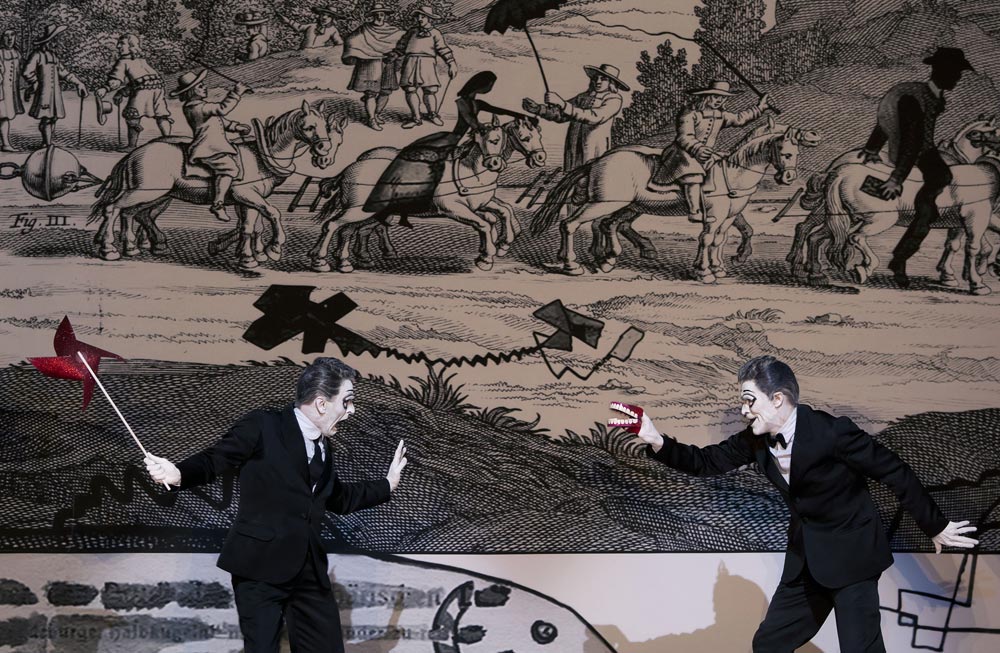
© Lucie Jansch. (Click image for larger version)
Kharms, an absurdist writer in the tradition of Gogol who blossomed in the brief period of creative freedom after the Revolution and before the Stalinist clampdown on “formalist” art, died in prison during the Siege of Leningrad, probably of starvation. His mugshot appears, briefly and without explanation, in Wilson’s staging: a haunted face with empty eyes. As is typical for Wilson, everything about this show is highly stylized, particularly the lighting, which has an almost tactile presence: cool greens, electric reds, sensual blues. Wearing the same black suits and exaggerated stage-makeup, Baryshnikov and Dafoe are transformed into twin cartoon villains or mimes. (They are remarkably similar in build, though Dafoe is slightly taller and Baryshnikov has a more sensitive face.) Each is fitted with a forelock styled in a comic, gravity-defying wave. But their personalities are so strong and so distinct that they never merge into one, and this is part of the fun.
If naturalism isn’t Wilson’s style, neither is pathos. With the help of Darryl Pinkney, he has taken Kharms’s already deadpan, but anxiety-provoking story—Why is a man carried off in chains at the train station? Are the neighbors spying?—and turns it into to an episodic, vaudevillian farce. This isn’t so much an adaptation as a riff on themes from the original. And considered in this light, it’s a tour de force, anchored by two exceptional performances and framed by Wilson’s pristine, meticulous esthetic. Everything is just so, from the actor’s choreographed, almost marionette-like movements and dances to the sound collage—a bit of Verdi’s Requiem, a charming musical-hall waltz, birdsong— that runs like a subliminal subtext. (There are, it must be said, a number of clichés, including the use of Arvo Pärt’s ghostly music to denote sadness, an oversized pistol, a pair of dentures that eventually finds its way to a man’s groin, implying castration.)

© Lucie Jansch. (Click image for larger version)
Without reading the novella, though, it’s hard to know how the disconnected, oft-repeated phrases are supposed to add up. Wilson isn’t interested in telling a story, which is fair enough; instead, the vaudevillian “numbers,” separated by blackouts, each riff on a single idea. We hear about an old woman falling out of a window, because she was too curious, a description of the effects of starvation, a flippant remark about the vileness of children. (Kharms hated children, but was forced to write children’s books to survive). Certain phrases are repeated what feels like hundreds of times, in different voices, accents, languages. Often the talking gives way to sound effects, giggles, screams, scraping sounds, humming.
Defoe is a master of vocal disguises; Baryshnikov, less so. The crisp diction required to fully master Wilson’s almost mechanical style eludes him, and he is not helped by the tiny microphones that have become ubiquitous in the theatre. But his voice acquires lyricism when he switches to a sing-songy, storybook Russian. And when he dances—little waltzes, a tango and Astaire-like numbers with pitter-pattering feet—the physical intelligence embedded in his bones is more than enough to make one stop wondering what, exactly, the point is supposed to be. Wilson is right to simply let him do his thing. In the end, the real pleasure of the evening is watching two extraordinary showmen (three if one includes Wilson) playing games together at such a high level.

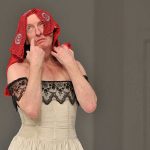
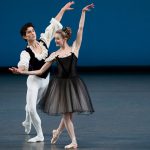
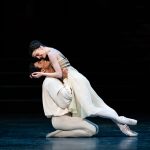


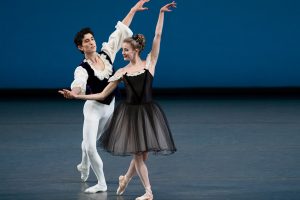
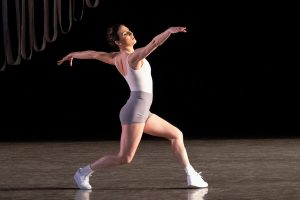

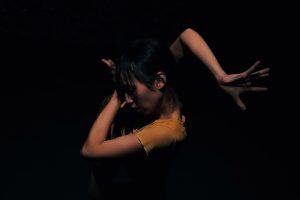
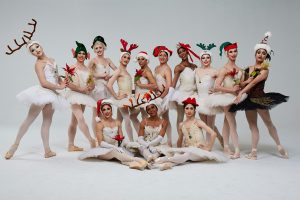


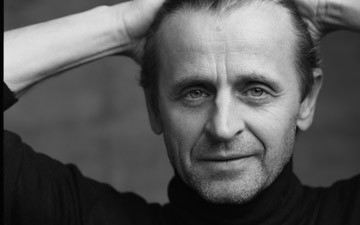
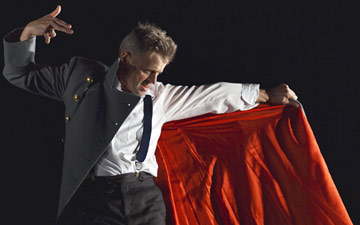


What a wonderfully written review, Marina. We are getting this production in Los Angeles and was so glad to get your take on it.